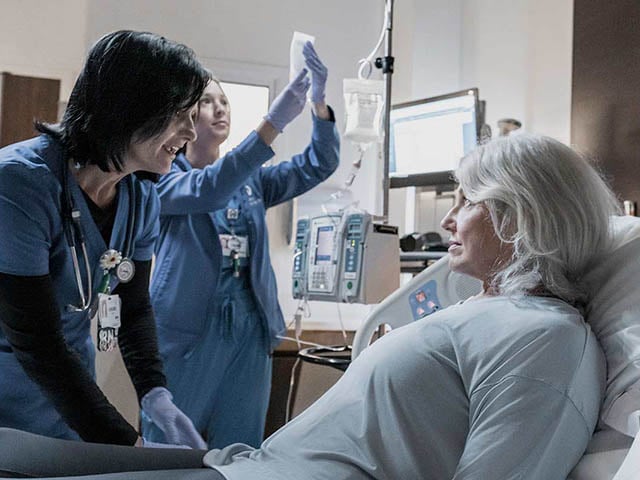What Is CAR T-Cell Therapy?
Chimeric antigen receptor therapy (CAR T cell therapy) is an immunological treatment that uses the body’s own immune system to destroy cancerous cells. Normally, a person’s T cells are responsible for detecting noncancerous "intruders," such as viruses and bacteria. However, by genetically modifying these cells to recognize the unique proteins that are present on the surface of cancer cells, it’s possible to program them to destroy cancerous cells while leaving healthy cells alone.
Who should consider CAR T cancer therapy?
CAR T therapy is currently only approved for patients with certain types of blood and bone marrow cancers. There are strict requirements in place that a patient must meet before he or she can begin CAR T therapy. The requirements differ depending on the specific type of cancer a patient has.
Generally speaking, a patient may be eligible for CAR T therapy if other forms of treatment, such as chemotherapy, have been unsuccessful or were not an option. Studies have shown that in certain cases when another type of cancer treatment stops working, CAR T therapy can produce favorable outcomes.
Schedule an appointment to discuss your eligibility for treatment. Call us at 1-888-663-3488 or request an appointment online.
What is the CAR T cell therapy process of administration?
The CAR T cell therapy process is as follows:
- During the T cell retrieval step, a sample of the patient’s blood will be taken and sent to a lab.
- At the lab, the patient’s T cells will be separated from the rest of their blood.
- Next, chimeric antigen receptor (CAR)—a special receptor that binds to certain proteins on cancer cells—will be added to the patient’s T cells.
- The patient’s T cells will then be duplicated and prepared for treatment.
Because different types of cancers have different antigens, it’s important that the CAR be customized to the specific cancer being treated. For example, CAR T therapies developed to treat the CD19 antigen present in certain types of leukemia and lymphoma will not be effective in treating other types of cancer that don’t have a CD19 antigen.
How does CAR T cell therapy work?
As was noted above, once the CAR is added to the T cells, the T cells are then duplicated and prepared for treatment. To prepare the body to accept CAR T cells, a few rounds of chemotherapy may be needed. Shortly after this, the CAR T cells are infused back into the patient.
CAR T therapy is a one-time treatment. Once the CAR T cells are reintroduced to the patient’s body, they can immediately start seeking out and attacking cancer cells. Several studies have also found that CAR T can be especially effective in patients who have stopped responding to all other therapies.
What to expect during the T cell collection process
 As was noted above, the first step in the CAR T therapy process is retrieving T cells from a patient’s blood (a procedure known as leukapheresis). While this is occurring, the patient will most likely be either sitting in a reclining chair or lying in a bed. A provider will attach two IV lines: one to remove blood from the patient’s body, and the other to return the blood to the patient’s body once the white blood cells have been removed.
As was noted above, the first step in the CAR T therapy process is retrieving T cells from a patient’s blood (a procedure known as leukapheresis). While this is occurring, the patient will most likely be either sitting in a reclining chair or lying in a bed. A provider will attach two IV lines: one to remove blood from the patient’s body, and the other to return the blood to the patient’s body once the white blood cells have been removed.
The collection process is relatively long, typically lasting for approximately two to three hours. In order to pass the time, patients may want to bring along a book or newspaper, a laptop or tablet or a music player (along with any necessary charging devices). They should also bring a list of all the medications they’re taking (both prescription and nonprescription), as well as paper and a pen to jot down answers to any questions they might have.
Although the patient likely won’t be in any pain while their T cells are being collected, decreased blood calcium levels may cause numbness, tingling and muscle spasms. If this issue arises, it can be managed by taking calcium, either by mouth or through an IV.
Does CAR T cell therapy produce any side effects?
It’s possible for CAR T therapy to produce certain side effects. These side effects are caused by the CAR T cells growing and attacking the cancer, causing high amounts of inflammation in the body, similar to how the body responds to infections. This is not unusual, as there is a risk of side effects with all types of cancer treatment. When side effects do occur with CAR T therapy, they’re typically temporary and able to be managed with treatment. Two of the side effects most commonly associated with CAR T therapy are:
- Neurological difficulties such as confusion, stupor and difficulty understanding language and speaking
- Cytokine release syndrome (CRS), which can cause fever, chills, dizziness, lightheadedness, headache, increased heart rate, low blood pressure, difficulty breathing, nausea, vomiting, diarrhea, muscle pain, joint pain, fatigue, shortness of breath and confusion
Because CAR T therapy has the potential to cause side effects, it’s important that patients be closely monitored while they’re recovering (the recovery process generally takes approximately 30 days). It’s normal for patients to feel fatigued and not have much of an appetite during this period, but caregivers should pay particularly close attention to signs of an infection or neurological difficulties.
CAR T therapy vs. chemotherapy
 One of the main differences between CAR T therapy and chemotherapy is the type of cells targeted by each form of treatment. Chemotherapy targets all of the cells in the body that are rapidly dividing, regardless of whether they’re cancerous or not. CAR T therapy, on the other hand, targets only cells that possess a specific target. Depending on the type of target, each type of CAR T may have additional side effects that are specifically related to killing healthy cells in the body that carry those targets.
One of the main differences between CAR T therapy and chemotherapy is the type of cells targeted by each form of treatment. Chemotherapy targets all of the cells in the body that are rapidly dividing, regardless of whether they’re cancerous or not. CAR T therapy, on the other hand, targets only cells that possess a specific target. Depending on the type of target, each type of CAR T may have additional side effects that are specifically related to killing healthy cells in the body that carry those targets.
What types of cancer does CAR T therapy treat?
Moffitt Cancer Center is world-renowned for its advances in cell therapy, and in fact, is among a select few cancer centers that have oncologists who are certified to administer CAR T therapy. We offer this option as a standard treatment for:
- Diffuse large B cell lymphoma
- Mantle cell lymphoma
- Acute lymphoblastic leukemia
- Multiple myeloma
- Follicular lymphoma
- Transformed follicular lymphoma
- Primary mediastinal B cell lymphoma
CAR T therapy clinical trials are available for many other types of cancers as well.
Moffitt’s researchers are continuing to study other diagnoses that could potentially benefit from CAR T therapy, as well as other immunotherapies that can help harness the power of the body’s own immune system in the fight against cancer. Our scientific breakthroughs have not only earned us recognition as a National Cancer Institute-designated Comprehensive Cancer Center, but also allow us the unique opportunity to provide each patient with an innovative treatment plan that is carefully tailored to the specifics of his or her diagnosis.
Medically reviewed by Hany Elmariah, MD, MS
To learn more about CAR T therapy, call 1-888-663-3488 or submit a new patient registration form online to request an appointment. We’re pleased to offer remarkably fast turnaround times, and when you reach out, you can expect to be connected with a cancer expert as soon as possible.
Helpful Links:
CAR T Therapy

